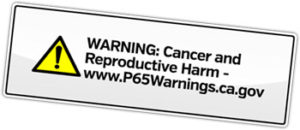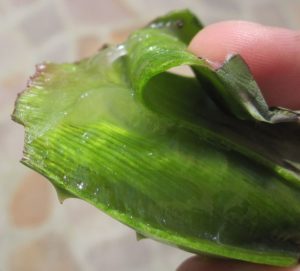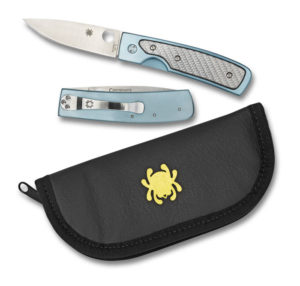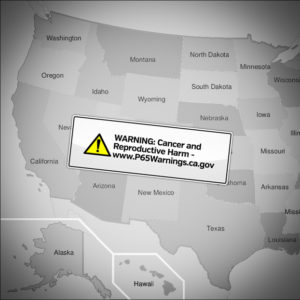 What’s up with all those warnings you keep seeing on knives? California – that’s what’s up. California’s Proposition 65 has recently expanded to include retailers and those who sell products manufactured under a private label. That’s right. Prop 65 warnings are now required in catalogs and on websites that sell to residents of California. And, if the product contains a chemical that puts it within the scope of Prop 65, it requires companies to specify at least one chemical in the warning. Failure to provide a warning to a consumer in California could result in fines of up to $2,500 per day, per instance. Count on it. You’re going to see a lot more of these warnings, so here’s some insight into how Prop 65 warnings relate to knives. Hopefully we can provide a little help in explaining the warning to others who might be confused.
What’s up with all those warnings you keep seeing on knives? California – that’s what’s up. California’s Proposition 65 has recently expanded to include retailers and those who sell products manufactured under a private label. That’s right. Prop 65 warnings are now required in catalogs and on websites that sell to residents of California. And, if the product contains a chemical that puts it within the scope of Prop 65, it requires companies to specify at least one chemical in the warning. Failure to provide a warning to a consumer in California could result in fines of up to $2,500 per day, per instance. Count on it. You’re going to see a lot more of these warnings, so here’s some insight into how Prop 65 warnings relate to knives. Hopefully we can provide a little help in explaining the warning to others who might be confused.
What is this very scary warning on my knife?
California’s Prop 65 requires businesses to warn consumers in California when any 1 of 900 chemicals on California’s list of “chemicals that cause cancer, birth defects or other reproductive harm” is present in that product.
What chemicals are on that list?
There are 900 chemicals on the list, and while it’s a fun list, we’re not going to list all 900 chemicals on it. We will, however, list a single “non-knife” chemical first, because the scope of these 900 chemicals is truly astonishing.
 Aloe Vera is on the list. Yes, that Aloe Vera. The number one favorite home remedy since the dawn of time is listed as “Aloe Vera, non-decolorized whole leaf extract. Aloe Vera, whole leaf extract meet[s] the requirements for listing as known to the state to cause cancer for purposes of Proposition 65.” Aloe Vera gel is fine, but a whole aloe leaf? Not fine.
Aloe Vera is on the list. Yes, that Aloe Vera. The number one favorite home remedy since the dawn of time is listed as “Aloe Vera, non-decolorized whole leaf extract. Aloe Vera, whole leaf extract meet[s] the requirements for listing as known to the state to cause cancer for purposes of Proposition 65.” Aloe Vera gel is fine, but a whole aloe leaf? Not fine.
That’s funny (and a little sad), but I’m worried about all these scary Chinese knife chemicals California is trying to warn me about!
Nickel, components in brass, components in steel (particularly stainless steel), and chemicals in epoxy resins are on the list. Go ahead and find a knife manufactured anywhere that doesn’t include one of those items. We’ll wait. Stumped? That’s because almost all knives contain something from the list. Let’s have a look at a few.
Nickel
- Nickel goes into all sorts of knife making components. Whether it’s in the bolsters, the liners, or the steel (carbon or stainless doesn’t matter much), nickel is probably in there.

Brass
- The chemicals that make up brass (including copper and zinc – often with about 2% lead) might be in the safe zone for the given usage, and might be well within Federal Guidelines, but California does not care. If it has brass, it needs a Prop 65 warning. How many times have you read “with brass pins and liners” in a knife’s feature description? We’re guessing a lot.
Stainless Steel
- Stainless steel contains chromium. Carbon steel also contains chromium but to a lesser extent. We’ve all seen Erin Brockovich, so we all know what that means! Well, not really, unless you plan on eating (actually ingesting) your knife. Additionally, you probably shouldn’t heat your knives to very high temperatures or inhale them.
Epoxy Resins
- Epoxy resins are on the list. It’s one of the main ingredients of G-10. It’s also used to secure handles to knives. Epoxy resins are used about a thousand ways in knife manufacturing. There are probably chemicals on the list in almost all handle materials, but our head sort of hurts from reading too much chemistry to list them all.

Long story short, knives almost always contain something on the Prop 65 list. It doesn’t matter where they’re made or how much they cost, and here’s the thing. Your knives have always contained some variation of those chemicals. Buck Knives so succinctly put it this way, “Our products are no different now than they were 30 years ago; but, because Buck Knives wants to continue to be a responsible manufacturer and continue to do the right thing, we have decided to include the warning label on our product packaging…. any/all products that contain one of the items on their list must have that warning label on it so the consumer can see it before he or she buys it.”
Does this warning mean that my knife is not safe?
Well, not according to the Office of the Attorney General in California. “This is not the same as a regulatory decision that a product is ‘safe’ or ‘unsafe.’” Your knife is exactly as safe as the knife your great grandfather carried lo those many years ago. It might even be safer. Matter of fact, the product doesn’t even have to meet the Federal Guidelines for safe chemical composition, because the “Proposition 65 warning requirements are independent of federal chemical use or composition standards.”
Further, “[a] product might be in compliance with a federal composition requirement because it contains no more than a certain percentage of lead, but not in compliance with Proposition 65 because it lacks a warning…” As it relates to Prop 65, and according to this, they don’t seem to care what the intended use for the item is. They seem only to care about the warning. A knife carrying a certain percentage of X chemical is deemed the same as the pipes in your home carrying X chemical.
 Well, I bought my knife from this company, and it doesn’t have that warning, so I’ll just stick with them!
Well, I bought my knife from this company, and it doesn’t have that warning, so I’ll just stick with them!
We defer once again to the mighty Buck: “[The Proposition 65 warning] doesn’t mean all companies apply the label to products even if they should.” Those chemicals are in your knives. They always have been. They always will be. Just because there isn’t a sticker warning you about dreaded chemicals (like nickel and Aloe Vera) doesn’t mean they aren’t in there. Most knives have chemicals from California’s Prop 65 list. Not all companies care about complying with the law.
Further, even those folks who want to warn don’t have to warn. There are exemptions to the Prop 65 “duty to warn.” If a company has less than nine employees or if the company doesn’t sell in California, they’re exempt. All federal, state and local government agencies, as well as entities operating public water systems, are exempt as well. None of those folks are required to provide a warning. Everyone else is supposed to either warn or risk being fined $2,500 per day, per instance.
 But I don’t live in California! Why is this warning on my box?
But I don’t live in California! Why is this warning on my box?
Companies have three options: Stop selling in California; Apply warning stickers only to boxes that go to California, or; Include a blanket warning that goes on all the items that contain whichever chemical is in that product. Which of the options do you think is most cost effective if you sell more than a few dozen items a day?
To sum up, don’t be alarmed by the Prop 65 warning. It’s only required for California. Its wide reach is meant to protect Californians from known chemicals, and the required label protects business owners from a potential fine of $2,500 per instance, per day from the state of California. The chemicals on the list that are also in your knives are no different than they’ve always been. And finally, almost every knife contains chemicals on that list to one degree or another. Your risk of exposure to “chemicals that cause cancer, birth defects or other reproductive harm” from handling or using a knife of any type or from any manufacturer is no greater now than it was back in 1986.
Consider yourself sufficiently warned. Go buy knives.




